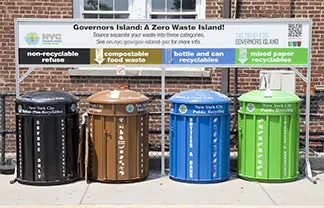

SCS Management Services™ helps many of our clients’ incorporate economic planning, financial analysis, and feasibility studies into their master planning and have requested copies of our articles. All can be found and filtered by topic area, and we are always ready to help you find the information you need.
Our articles may be printed or shared using the icons on the left navigation bar. Or, you may share or email this page to keep it handy. SCS respects your privacy; we do not monitor or collect your email address or information.
Contact Vita Quinn for more information. Ms. Quinn is SCS Engineers’ National Expert on Solid Waste Finance and Rate Studies. She has 12 years of experience as a financial analyst and management consultant. She has extensive experience working for local government and has developed financial sustainability solutions for various general governments, special revenue funds, and utility enterprise funds. Ms. Quinn has an MBA in Finance and a Bachelor’s Degree in International Economics.

Residential Automated Collection Makes Sense for Idaho Falls
The Nuts and Bolts of Implementing a Residential Automated Collection Program
Conducting a Rate Analysis as Part of a Master Plan Study in Killeen, Texas
https://www.scsengineers.com/scs-articles/conducting-a-rate-analysis-as-part-of-a-master-plan-study/

Conducting Solid Waste Rate Studies and Business Plans
https://www.scsengineers.com/conducting-solid-waste-rate-studies-and-business-plans/
Get a Firm Handle on Solid Waste Costs to Optimize Performance
https://www.scsengineers.com/get-a-firm-handle-on-solid-waste-costs-to-optimize-performance/
Cash Flow Analysis Forestalls Long-Term Debt
Is Privatization the Answer? You Need to Consider Several Factors Before Making the Decision for Solid Waste Services
https://www.scsengineers.com/publications/articles/page/11/
Developing a Strategic Business Plan for Your Agency
Economic Feasibility 101 – Understanding the Tools of the Trade
Assessing a Solid Waste Agency’s Financial Health
Are Your Rates Correct? Collection and Disposal Rate Studies are a Valuable Tool
Integrating Financial Analysis into Solid Waste Operations Planning

Recycling Trends in the United States
https://www.scsengineers.com/scs-articles/6555/

Anaerobic Digester Economics
Give SCS a call or send an email to if you have questions. Find your local office here: https://www.scsengineers.com/locations/. Visit our Solid Waste Planning Services page for additional information, articles, whitepapers, and case studies.
There is no single best approach to financing fleet replacement costs. With the financial challenges facing local governments today in providing cost-effective and timely solid waste management services, evaluation of these various approaches should be made focusing on ways to minimize costs while providing value-added services to the public.
Marc Rogoff discusses a number of alternative vehicle/equipment purchasing programs, which are being used by solid waste agencies to preserve cash. Each of the financing methods described has its own particular advantages and disadvantages, which can be influenced by local municipal circumstances.
Read the complete article here.
Read and share the WasteAdvantage article describing the solution process here. Written by:
Increasingly, solid waste and recycling agencies are being asked by their political decision makers to improve efficiency, focus on customers, and reduce increased costs. Many agencies are managed with a combination of manual processes, desktop computer tools, limited vehicle and cart tracking and management tools, and custom databases. While effective, these methodologies often entail more effort, labor, and costs.
Smart technologies are expected to grow substantially over the next decade as agencies attempt to minimize their overall costs in solid waste collection and recycling and increase overall efficiency. As discussed briefly in this article, smart technologies have advantages and disadvantages. As agencies investigate technology to help support their service, ensure continued quality service delivery and meet demanding business requirements, it is important to conduct feasibility assessments to evaluate the economic costs to implement and update the use of new technologies in a sustainable manner.
Marc J. Rogoff and Laurel Urena of SCS Engineers.
We hope you find this Waste360 article helpful.
http://www.waste360.com/fleets-technology/what-s-next-route-optimization
Other related articles of interest include financing and rate studies see Solid Waste Management Services at SCS Engineers.
Rogoff will be leading a panel at this year’s WasteExpo in New Orleans. The session on Route Optimization Management will take place on Monday 8 at 9:00 AM. See more presentations and topics at Waste Expo 2017.
Using non-ad valorem assessments in solid waste management are based on the improvement or service cost allocated to a property and are levied on a benefit unit basis, rather than on value. Under the special assessment system, there is less incentive to drop out of program participation even if solid waste costs increase.
The best source of data for compiling the assessment roll is the records of the county or city official responsible for property appraisal and valuation. Limitations may exist with the data because these records are maintained for the purpose of determining property valuations, not for performing solid waste or other non-ad valorem assessments. However, additional information such as benefits rendered, occupancy, and frequency of benefits could be developed in order to convert the initial records into a complete and accurate assessment role.
Click here to read this insightful article by Marc Rogoff and Laurel Urena of SCS Engineers.
In the EPA’s Region 9 U.S.-Mexico Border Program Progress Report, April-September 2016
The Campo Band of Mission Indians (CBMI) staff members are working with the EPA and SCS Engineers to address their waste management needs. SCS Engineers, an environmental engineering firm, was contracted by the Border Environment Cooperation Commission to work with CBMI in response to their request for technical assistance.
SCS Engineers was contracted to prepare a waste characterization study to support the development of a zero waste plan. The study provides critical information for designing and developing the future programs, policies, and facilities to effectively achieve a zero waste program.
Based on the findings, CBMI will assess their infrastructure needs, including consideration of a transfer station. SCS Engineers conducted field sampling to assess the Golden Acorn Casino in September 2016, the same month that Jeff Scott, EPA’s Land Divison Director visited Campo.
The Border 2020 Program is the latest environmental program implemented under the 1983 La Paz Agreement. It builds on the Border 2012 Environmental Program, emphasizing regional, bottom-up approaches for decision making, priority setting, and project implementation to address the environmental and public health problems in the border region. As in Border 2012, the new Program encourages meaningful participation from communities and local stakeholders.

Caroline Larose was awarded the Robert P. Stearns – SCS Engineers Master’s Scholar this year. Her project, “Material Flows: Strategies to Reduce Ann Arbor’s Municipal Solid Waste and Improve Diversion,” consists of a comprehensive benchmarking analysis of urban waste programs and a review of city stakeholders to distill a set of MSW management, education, and awareness best practices. Following her research, Caroline plans to draft recommendations for the City, which will include updated MSW goals and an action plan to improve diversion and reduce waste creation.
About Caroline Larose
Caroline chose to go back to school to further her pursuit of making cities more sustainable. She identified solid waste as her primary research focus and has worked towards her idea of eliminating waste as a concept. Caroline is now in her third year as a dual MBA/MS student at the Erb Institute for Global Sustainable Enterprise at the University of Michigan.
Caroline works to promote waste reduction and diversion on campus and throughout the Ann Arbor community by advising the implementation of campus-wide composting and uniform bin signage, as well as by organizing events such as the first Ross School of Business Waste Audit & Education Day and annual clothing swaps. Caroline, a member of the University-wide Student Sustainability Initiative board, has served as the VP of Sustainability for the Ross Net Impact chapter for 2-years. As a result of her leadership on campus, Caroline was selected to join the Ann Arbor Resource Management Team, advising the City of Ann Arbor on how to reduce its solid waste and improve diversion.
Getting a firm handle on a solid waste operation and expenses is a challenge for any solid waste agency manager or landfill operator. It is particularly imperative in this era of “lean and mean” budgets and looming regulatory policy. Doing more with less is the watchword for most operations across the country still reeling from the financial impacts of the Great Recession.
SCS Engineers has created a package of articles to help you identify if your landfill, landfill gas, or solid waste operation is ready for 2017. We hope this useful guidance will help you plan for the upcoming year. SCS professionals are always available to answer questions and provide advice. Find the office or SCS professional nearest to you by clicking on one the links here: Offices and Professionals.
Download, print or share this package by using the download button under the articles or by using the navigation at left. The package includes the following information written by SCS National Experts:

Read the full article by Marc Rogoff, SCS Engineers.